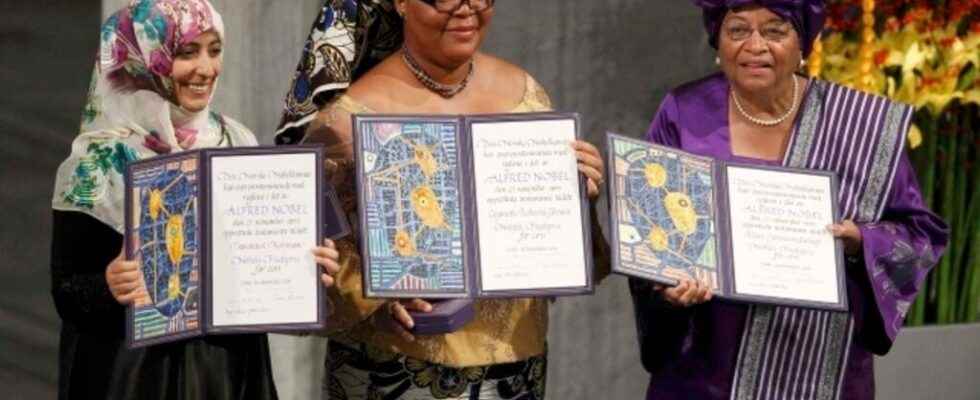Often presented as victims bending under the weight of the family, economic difficulties and patriarchy, the women of Africa nevertheless present a completely different face: that of fighters who set an example, to conquer all. circles of power and influence.
1. The glass ceiling has been shattered in politics with the election ofEllen Johnson Sirleaf in Liberia in 2005. Since then, examples of women presidents have multiplied: Joyce Banda in Malawi (2012-14), Catherine Samba-Panza in the Central African Republic (2014-16), Ameenah Gurib-Fakim in Mauritius (2015-18), not to mention the two heads of state currently in office, Saleh-Work Zwede since 2018 in Ethiopia and Samia Suluhu since 2021 in Tanzania. Aminata “Mimi” Touré, from Senegal, is one of the 15 African women who have held the post of Prime Minister, out of a meager total of… 93 around the world.
2. The most powerful in Africa also stand out global positions of power. Nigeria’s former finance minister, Ngozi Okonjo-Iweala, has been Director General of the World Trade Organization (WTO), the heart of the reactor, since March 2021. Since 2016, the Senegalese Fatma Samba Diouf Samoura leads the dance in the world of football, as secretary general of the International Football Federation (Fifa). The former Minister of Foreign Affairs of Rwanda Louise Mushikiwaboshe has been restoring order to the affairs of the International Organization of La Francophonie (OIF) since 2019.
3. Number of african diplomats are active or have been in the UN system. Among them, the Dr. Matshidiso Moeti, a doctor from Botswana, the first woman to be appointed in 2015 as regional representative of the World Health Organization (WHO) for Africa, has been on the front line since the start of the Covid-19 pandemic. To name a few, the Algerian magistrate Leila Zerrougui left her post as head of Monusco in 2021, and the Guinean Bintou Keita, former UN Under-Secretary General, took over. The Rwandan diplomat Valentine Rugwabiza will lead the Minusca in April, with a workforce of 15,800 people, in the Central African Republic.
4. Some African countries are the most advanced in the world in terms of parity among deputies : Rwanda ranks first with 61.3% of women in the lower house, against a world average of 26%. South Africa, where they are also among the youngest elected representatives in the world, ranks eighth (47% of women deputies). Namibia ranks 16and and Senegal 19andbetween Spain and Switzerland, well before France (33and).
5. They are internationally recognized opinion leaders, four of them having received Nobel Prizes: the South African novelist Nadine Gordimer in 1991, the Kenyan environmental activist Wangari Maathai in 2004, and in 2011 the Liberians Ellen Johnson Sirleaf, president, and Leymah Gbowee, activist for peace. Translated into 30 languages, Chimamanda Ngozi Adichie makes her voice heard in literature, but also renews the feminist wordwith texts like We should all be feminists (2014, Fourth Estate) and Dear Ijeawele, a manifesto for feminist education (2017, Gallimard).
6. They excel in the press and the digital world. In South Africa, Ferial Haffajee is at 54 the associate editor of the online daily Daily Maverick and a monument from the 4and power. She was editor-in-chief of Mail & Guardianof CityPress and HuffPost South Africaand repeatedly stood up to those responsible for the regime of Jacob Zuma.
The cyber-activist Ory Okollohwhich has proven itself in Kenya by founding the software open source Uhashidi, before being named a strategist at Google, is now ” Policy Guru, Connector Extraordinary and Chief Unblocker of Things “, as she describes herself on her Linkedin profile. It is no longer alone in the digital firmament in Africa. Jocelyne Muhutu-Remyoriginally from Rwanda, based in Johannesburg and former head of media partnerships for Facebook in Africa, has been the general manager of Spotify South of the Sahara since November 2021.
7. They largely lead the way in contemporary art, both as highly rated artists like Julie Mehretu (Ethiopia), curators like Ngoné Fall (Senegal) or directors of important fairs, like Touria El Glaoui (Morocco) with 1:54. They now run major museums, with the Cameroonian Koyo Kouoh at the Zeitz-Mocaa in Cape Town, and the Canadian-South African Blankengerg at the head of the Smithsonian Museum of African Art in Washington.
8. Far from being the last wheel of the carriage, they stand out more generally through their full participation in the labor market, with the highest rate in the world in this area (55% according to French Development Agency – AFD), compared to a global average of 48%. According to the World Bank, this rate even exceeds 70% in Ethiopia, Cameroon, and all along a belt that goes from Angola to Madagascar via Zambia, Zimbabwe, or even Mozambique.
9. They undertake more than anywhere else : according to the firm’s specialized studies Roland Bergerbased in Munich, they would be 24% to start a business, well ahead of women from Latin America (17%), North America (12%), South-East Asia ( 11%) and the Middle East (9%).
10. Of the 10 countries that have made the most progress in terms of economic paritysix were in the Middle East/North Africa region and three in Sub-Saharan Africa in 2020, according to the report The women, Business and the Law 2020 of the World Bank. Two years later, while the pandemic has passed by, progress is still welcomed in these two regions. According to the 2022 report, “ of the 39 laws that changed through reforms, 10 were enacted in the Middle East and North Africa “.
